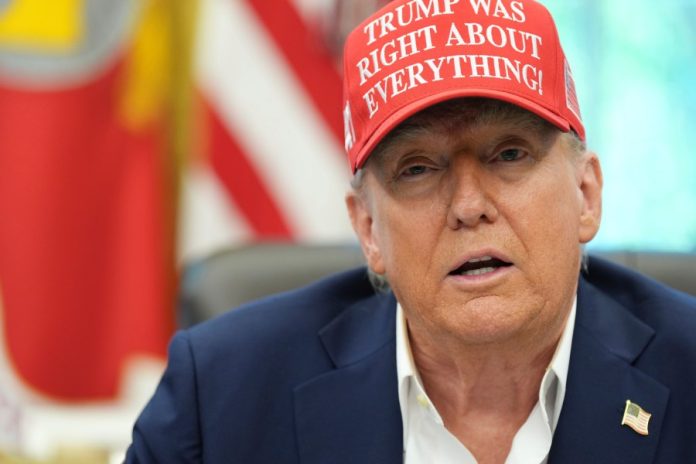
Four months after Liberation Day, President Trump is poised to declare victory in his trade war. In July, he trumpeted his latest agreement with the E.U. as “the biggest deal ever made.”
With the reigniting of Trump’s trade war in early August, the last month has delivered a raft of trade headlines as foreign emissaries have scurried to the White House to make deals. Even if these makeshift agreements result in marked reduction from Trump’s Liberation Day tariffs, all indications point to the U.S. entering a far more protectionist era.
Ever the showman, Trump loves touting his trade war’s “success” by pointing to reopened factories and re-shored jobs. Strategically speaking, it’s brilliant retail politics. Ribbon-cutting at revived plants, flanked by dozens of smiling workers, make for great publicity.
Alas, Trump’s cunning marketing ploy has resurrected one of the oldest and most notorious myths in economics: Frédéric Bastiat’s “broken window fallacy.”
Suppose a vandal hurls a rock through a shopkeeper’s window. The shopkeeper is dismayed—this cruel stroke of luck will cost him $1,000. But a local wise guy consoles him, saying, “Actually, there’s a silver lining in this dark cloud!” The broken pane, he explains, creates a job for the local glazier. Perhaps he’ll use those hard-earned shekels to buy shoes from the local cobbler, and so on. Society is ultimately made richer from the shopkeeper’s misfortune — all thanks to the domino effect of spending triggered by two seconds of petty mischief.
It’s a nice story — but as Bastiat illustrates, it’s wildly incomplete. Had the window not been shattered, the shopkeeper could’ve spent his $1,000 on something else he valued. Perhaps he would have bought a new suit, creating income for a local tailor. Or maybe he would have bought some meat, ale, and bread for a party, creating income for the local butcher, brewer, and baker.
The fatal flaw in the wise guy’s analysis, Bastiat concludes, is confining his theory to “that which is seen” — the income earned by the glazier, the cobbler, etc. In so doing, he ignores “that which is unseen” — everything else the shopkeeper could have bought, had his window not been smashed.
Regrettably, we’ll never see what the shopkeeper would have done with that $1,000. All the products he might have bought and the jobs he might have helped create remain forever hidden in counterfactuals. All we know for certain is that society is poorer to the tune of one window.
Bastiat’s broken window fallacy wasn’t originally about tariffs, but it could have been. The logic is identical: Whether breaking windows or blocking imports, the visible gains in one sector come at the expense of unseen losses elsewhere. In the former case, resources are diverted towards less desirable uses (repairing windows). In the latter, they are diverted to less productive ones.
Should the goal of U.S. trade policy be to raise an army of millions of Americans to assemble iPhones, as Commerce Secretary Howard Lutnick suggested? Not if it comes at the expense of better jobs — for example, designing iPhones. If a $25,000 assembly job displaces a $125,000 design job, Americans aren’t $25,000 richer — we’re $100,000 poorer, and plus we will be stuck paying much higher prices for iPhones. Dave Chappelle had it right: Americans want to buy iPhones, not make them.
Today’s protectionists echo this fallacy with uncanny precision. The fact that trade gets such a bad rap in American politics today is a sad testimony to this myth’s resilience. Tariffs are a clever way for politicians to smash economic windows, then brag about the jobs they create to fix them.
When Trump hails the “return” of American manufacturing thanks to his tariffs, he is cleverly drawing our attention to that which is seen: Look! New factory jobs! New, American-made products! But beware the sleight of hand. Those gains, while real for a few, come at a hidden cost to the many.
Economists often focus on the visible consequences of tariffs (higher prices). It’s an understandable instinct, since tariff surcharges are easy to point out. But Bastiat’s parable highlights the unseen consequences — difficult to measure, impossible to point to, but they’re every bit as real and destructive to the economy.
Free trade, in contrast, avoids breaking windows in the first place. Buying cheaper imports saves Americans money, which they can spend, save, and invest elsewhere in the economy. Globalization doesn’t merely give us cheap washing machines and plentiful dolls. It frees us to specialize in better, higher-paying jobs.
The result isn’t a hollowing out of the middle class or a “giant sucking sound” of jobs leaving the country — it is mass flourishing.
The Trump administration launched today’s trade war on the basis that our persistent trade deficits since 1975 constitute a “national emergency.” Yet over those 50 years, U.S. real GDP per capita has more than doubled, and the real net worth of U.S. households has more than tripled. All the while, the share of the world’s population living in poverty plummeted from 50 percent to 8.5 percent.
Trump is a brilliant escape artist. He routinely defies the laws of political gravity. But he can’t escape the laws of economics. Restricting trade doesn’t bring us prosperity, any more than paying vandals to destroy property creates wealth. All protectionism delivers is higher costs and a stagnant economy.
Scott Burns is the Charles E. Blackwell associate professor of economics at Southeastern Louisiana University. Caleb S. Fuller is an associate professor of economics in the Winklevoss School of Business at Grove City College and a Research Fellow with the Independent Institute.

